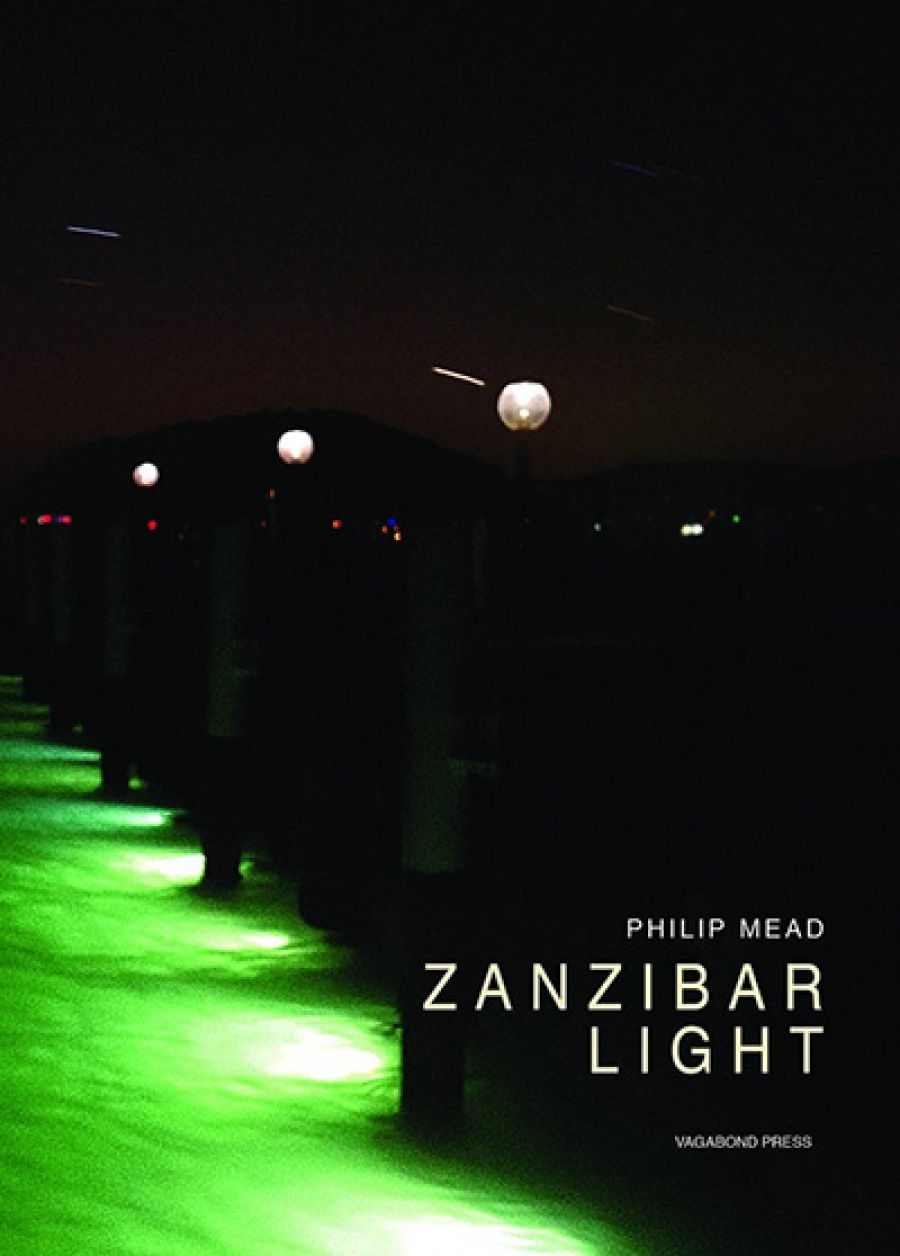
- Free Article: No
- Contents Category: Poetry
- Custom Article Title: Judith Bishop reviews 'Zanzibar Light' by Philip Mead
- Review Article: Yes
- Online Only: No
- Custom Highlight Text:
There is a shimmering, ludic intelligence to this collection of poems, Philip Mead’s first since 1984. The word ‘comeback’ is apt, with its grace note of gladness for renewed possibilities. Opening any new work, the anticipation is acute: will I be changed by reading this, and if so, how? What might I think, feel, or recognise ...
- Book 1 Title: Zanzibar Light
- Book 1 Biblio: Vagabond Press, $24.95 pb, 104 pp, 9781922181701
In Zanzibar Light, lyric devices, and the daily tropes of language, are cleverly revealed as such by Ashberian processes of estrangement by disjunction. Mead prepares the reader, at certain points, for what they will encounter: ‘The constellation of sunset / clauses rolls away from every possible referent I can imagine’; ‘What kind of methods are available, anyway, for tragic views? / It’s irresponsible but I just wanted to drift through the scenes / getting lost in the stacks … ’; ‘It’s more about what steps you happen to take, rather than / any syllogism of intent. Your steps, not predictive text’; ‘… any old dream, dissolving, is somewhere you can belong’.
Throughout the book there is a kind of gentle ambush going on: one imagines the poet hiding linguistic and cultural grenades and running for cover before the reader comes. Part of the pleasure lies in ferreting them out. I am reminded of Stephen Burt’s notorious definition of ‘elliptical poets’ in the Boston Review (1998), as those for whom the coherence of the poem, its speaker and its time, are placed in question by a plethora of knowing devices. Thus, a number of the poems in Zanzibar Light proceed by statement and elaboration – a near-ubiquitous move in poetry – but both steps are parodied by substituting odd referents within the familiar-sounding frames (e.g., below, ‘X has happened … ’, ‘Y announces itself … ’, ‘Z has fallen across … ’; ‘I need an X … ’, ‘now that it’s time to Y … ’), and sometimes, oblique equivalents: ‘shedload’ for shitload, and elsewhere, ‘iguanadon’ for elephant):
A shedload has happened though, the family continues to adjust
a bright, twirling salad announces itself in the titles
a strange distortion has fallen across all official things
and
I need a hub for my learning community,that much is clear
now that it’s time to think about the strange piers of natural light
I’ve been experiencing, half cartouche, half self-portrait against a field
of icy green crystals …
The book is divided into five sections. Most poems are untitled. Many are fourteen lines long, thus nodding, at some distance, to the sonnet (turned floating signifier). The punctuation (sometimes present, sometimes not) and divisions between the poems are deliberately ambiguous, wavering between continuity and completion. One poem ends, ‘announcers who have come through a cancer-scare, linear’, while the next begins, ‘thinking often ends in tears, because that’s where the steps’.
 Philip MeadThe third section of the book contains three slightly longer poems. One of these, ‘Romadur and Kümmel’, presents a faux analysis of a non-existent Occitan romance. It is a light but well-sustained exercise in the half-comedic emptying and refilling of poetic signifiers – half-comedic, because the sting in the tail is the lost belief in authenticity: the nicely resonant names of hero and heroine, as it turns out, are the pairing of a German cheese and a Dutch liqueur.
Philip MeadThe third section of the book contains three slightly longer poems. One of these, ‘Romadur and Kümmel’, presents a faux analysis of a non-existent Occitan romance. It is a light but well-sustained exercise in the half-comedic emptying and refilling of poetic signifiers – half-comedic, because the sting in the tail is the lost belief in authenticity: the nicely resonant names of hero and heroine, as it turns out, are the pairing of a German cheese and a Dutch liqueur.
Despite the entertainment, a weariness is communicated: if all Xs can be Ys, all surface, nothing depth, where to rest our minds, that doesn’t slide away from under us? Perhaps a clue lies in the book’s many poem dedications. The act of sharing a poem, and the experience of language and life that inheres in it, creates a ground of sorts. As Mead writes in ‘After the Flood’: ‘whatever you do, finish with a song if you can, even if it’s late’.


Comments powered by CComment